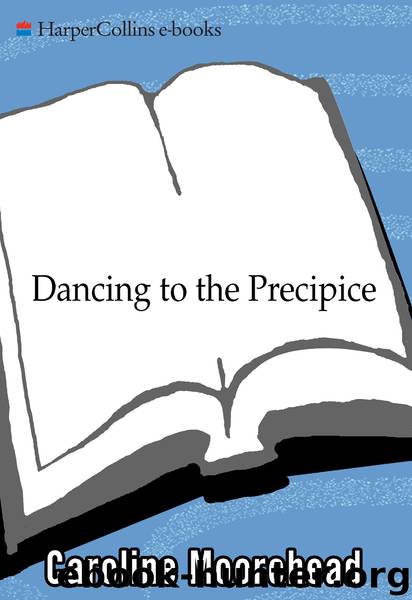Dancing to the Precipice by Caroline Moorehead

Author:Caroline Moorehead
Language: eng
Format: epub, mobi
Publisher: HarperCollins
CHAPTER ELEVEN
Hordes of Vagabond French
Their boat left Calais for Dover at eleven o’clock at night. Though the south-easterly wind was light and the sky cloudless, Frédéric immediately took to his bunk, overcome by his usual seasickness. Lucie went up on deck and found a hatch cover to perch on, holding Charlotte on her knee. Seated next to her was a young man who offered her a shoulder to lean against: he turned out to be the son of the editor of the Edinburgh Review, whom she had known in Boston. They spent the night talking about America; Lucie told him that if it proved impossible to return to France before too long, her plan–her wish–was to go back to the farm in Troy. With the pale dawn of an English September came her first sight of the cliffs of Dover.
By 1797, the English had become accustomed to their many French visitors, few of whom had risked, as Lucie and Frédéric had, too quick a return to France after the Terror. Fugitives from the revolution had been reaching the shores of the south coast since the summer of 1789, in waves that increased in response to each new incident of violence and each new repressive law against the French Church and the nobility. One of the first to come had been the Prince de Condé, who brought with him 28 servants; later had come soldiers, fleeing anarchy in the army, ‘non-juror’ clerics who refused to sever their vows to the Pope, aristocrats on the list of ‘suspects’, and all the wig-makers, chefs, valets and coachmen who had once looked after them. Many were unclear as to whether they were betraying the King in abandoning him to his fate, or had been driven into exile by his weakness. ‘La patrie [the fatherland] becomes a meaningless term,’ noted the Comte d’Antraigues, ‘when it has lost its laws, its customs, its habits…France for me is nothing but a corpse, and all one loves of the dead is the memory of them.’
Singly or in groups, among them entire congregations of priests and convents of nuns, these soldiers and clerics and servants had arrived, some bringing money in bags and accompanied by retainers, others destitute, bedraggled and disguised as women or sailors. When a party of 37 religious sisters from a convent at Montargin put ashore on Shoreham beach, curious spectators gathered to peer at the ‘fugitive virgins’. For the most part, those arriving had been received kindly and with generosity. While they were unlikely to ‘much contribute to our amusement’, said Gibbon, these people were entitled to pity and esteem.
Though by 1797 France was again at war with England, for the third time in 40 years, the French and the English were inextricably entangled, importing each other’s fashions and craftsmen, reading each other’s Enlightenment philosophers, sharing notions of ‘bon ton’ and good taste. When, before the revolution, the English aristocracy had visited Paris, they had mixed naturally with the inhabitants of the Faubourg Saint-Germain. Lucie’s
Download
Dancing to the Precipice by Caroline Moorehead.mobi
This site does not store any files on its server. We only index and link to content provided by other sites. Please contact the content providers to delete copyright contents if any and email us, we'll remove relevant links or contents immediately.
| Belgium | France |
| Germany | Great Britain |
| Greenland | Italy |
| Netherlands | Romania |
| Scandinavia |
Room 212 by Kate Stewart(5102)
The Crown by Robert Lacey(4802)
Endurance: Shackleton's Incredible Voyage by Alfred Lansing(4760)
The Iron Duke by The Iron Duke(4348)
The Rape of Nanking by Iris Chang(4200)
Joan of Arc by Mary Gordon(4098)
Killing England by Bill O'Reilly(3994)
Say Nothing by Patrick Radden Keefe(3974)
I'll Give You the Sun by Jandy Nelson(3424)
Shadow of Night by Deborah Harkness(3356)
Hitler's Monsters by Eric Kurlander(3327)
Mary, Queen of Scots, and the Murder of Lord Darnley by Alison Weir(3194)
Blood and Sand by Alex Von Tunzelmann(3192)
Eleanor & Park by Rainbow Rowell(3149)
Darkest Hour by Anthony McCarten(3117)
Margaret Thatcher: The Autobiography by Thatcher Margaret(3073)
Book of Life by Deborah Harkness(2927)
Red Famine: Stalin's War on Ukraine by Anne Applebaum(2917)
The One Memory of Flora Banks by Emily Barr(2854)
